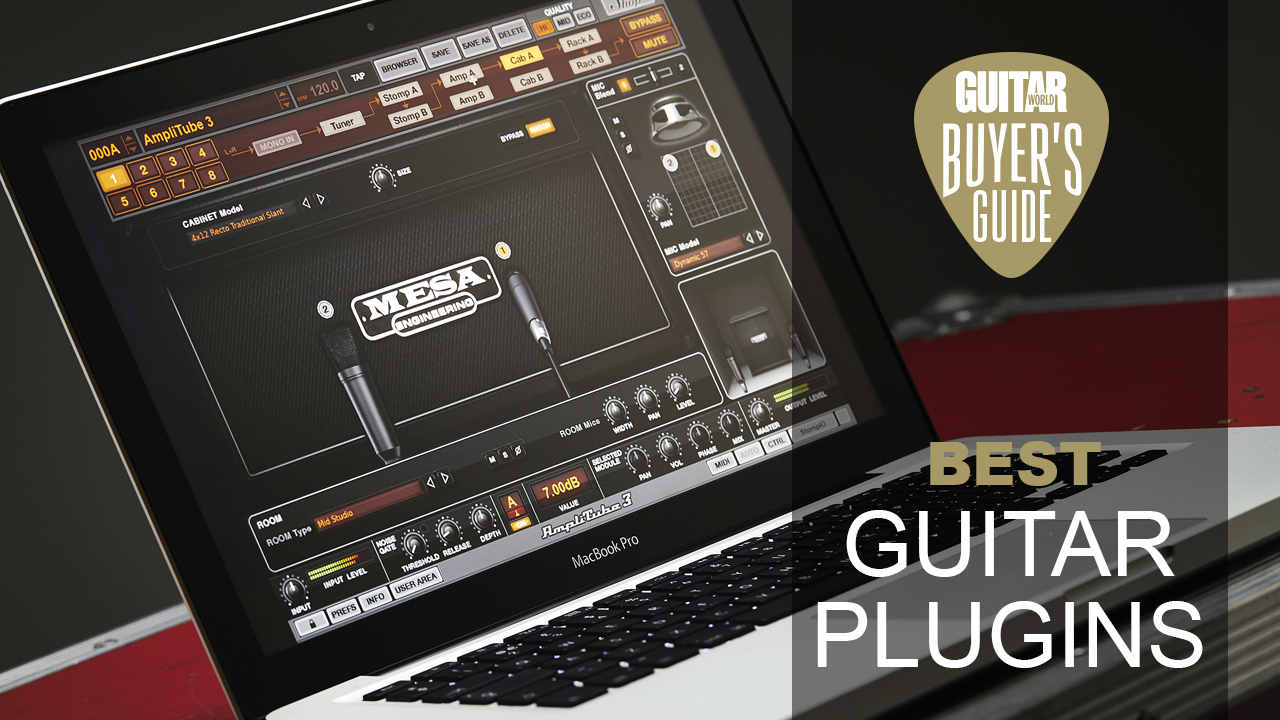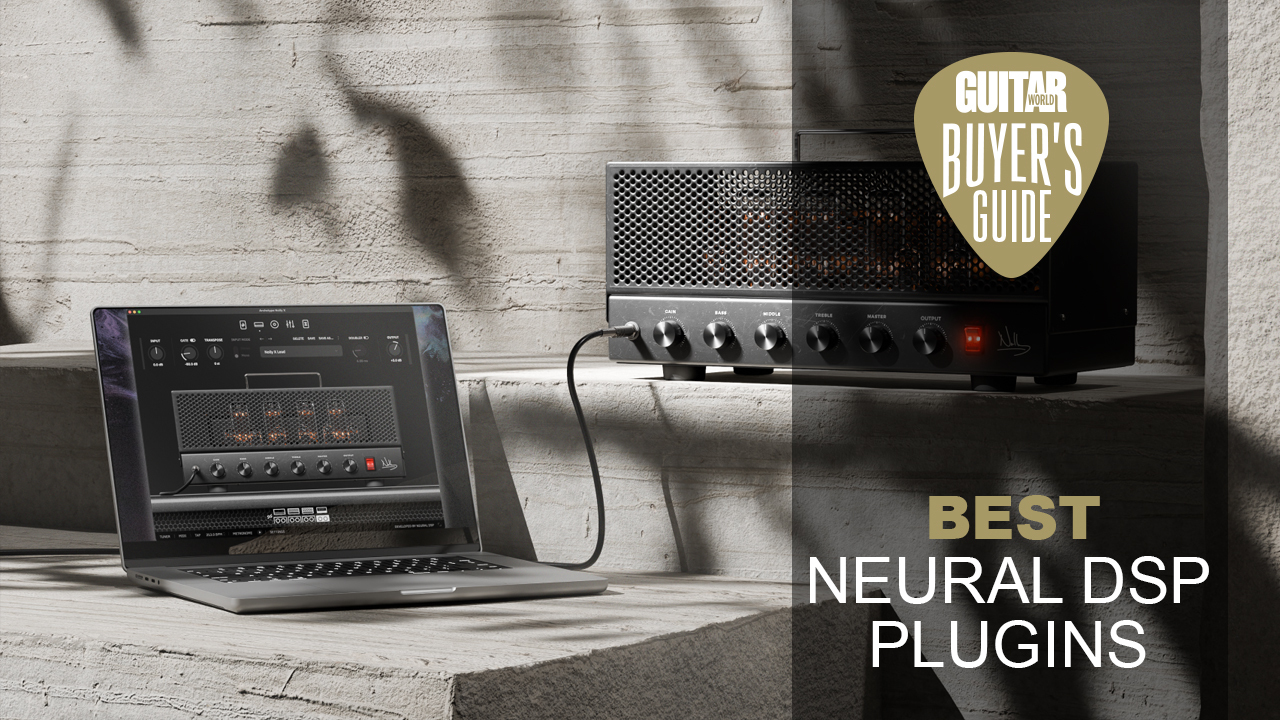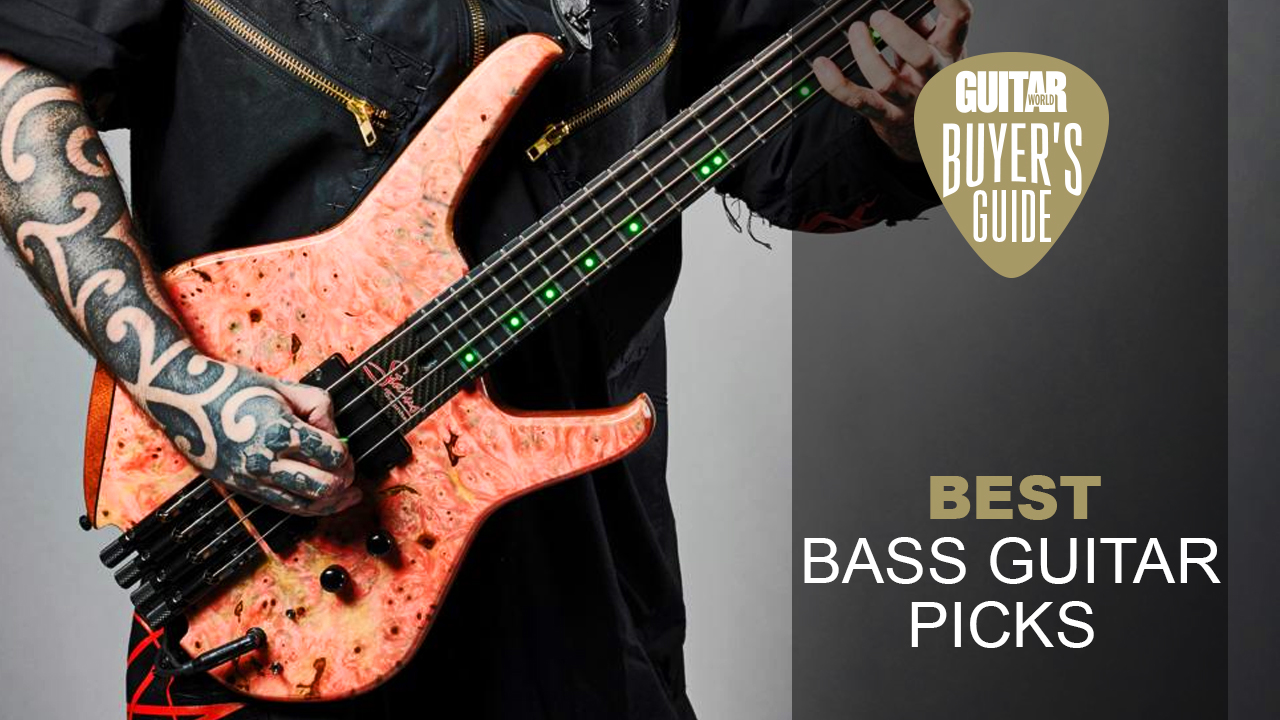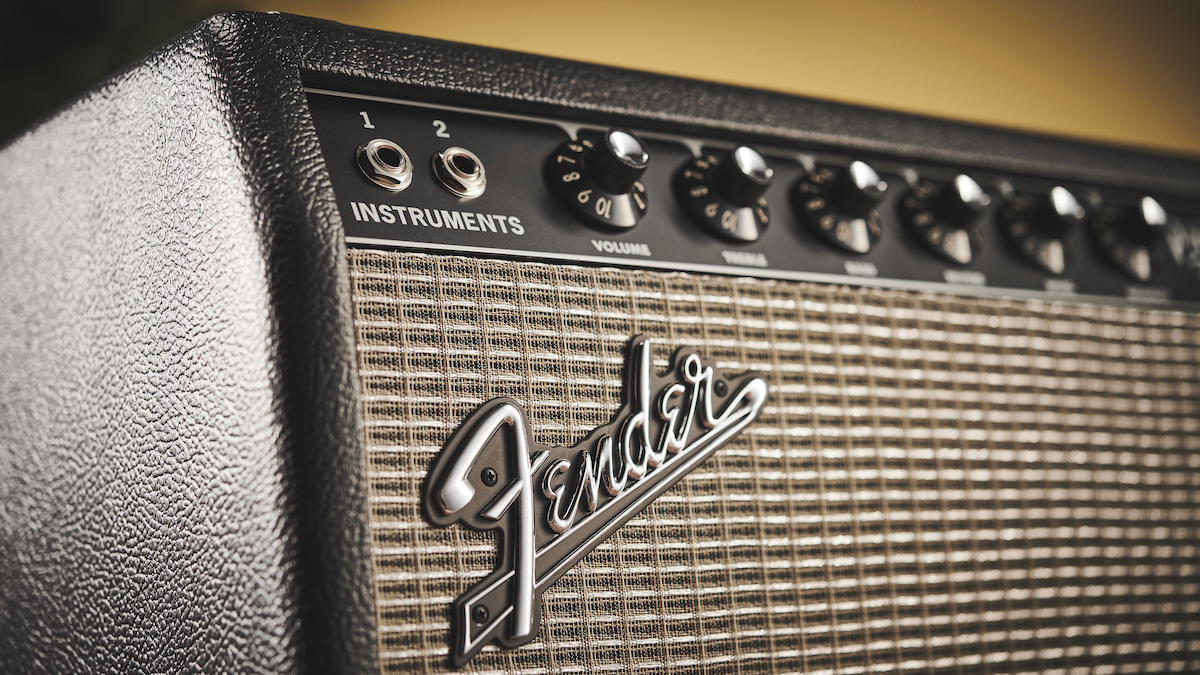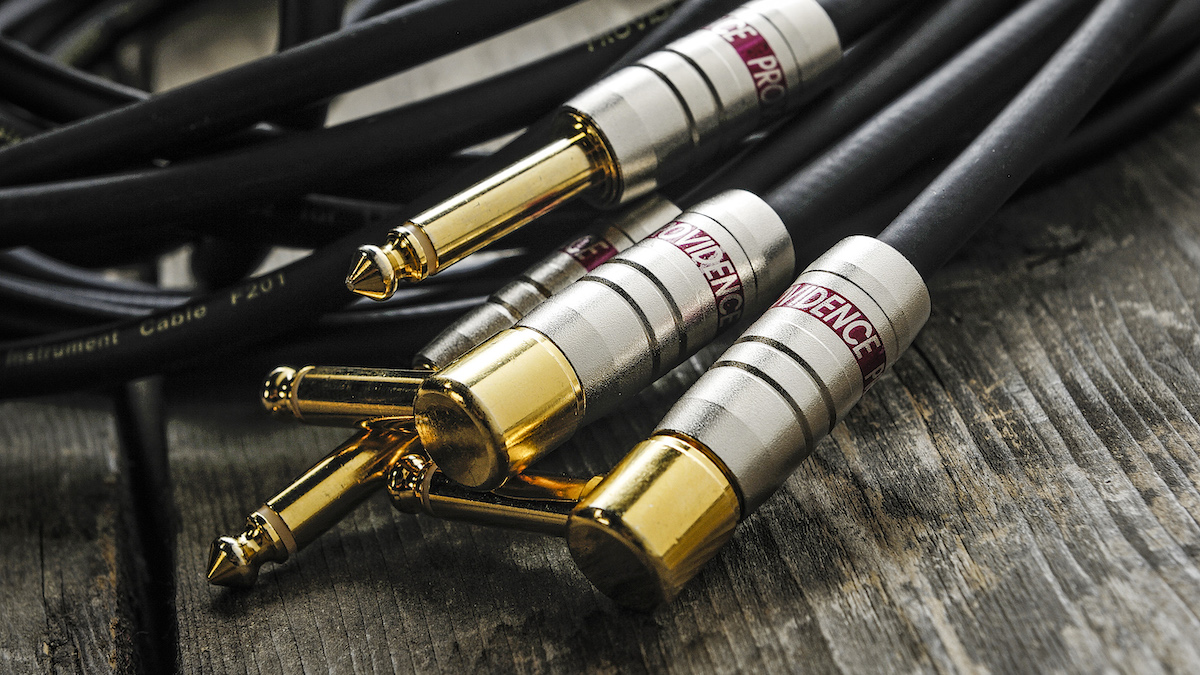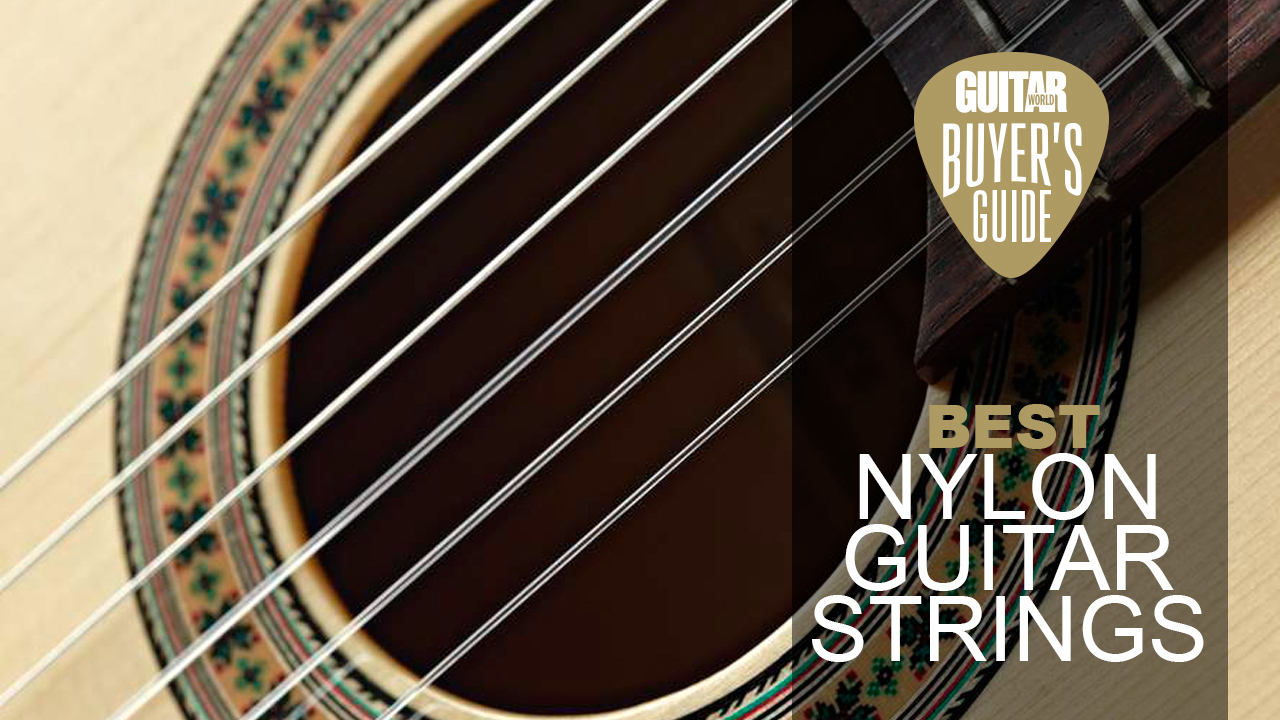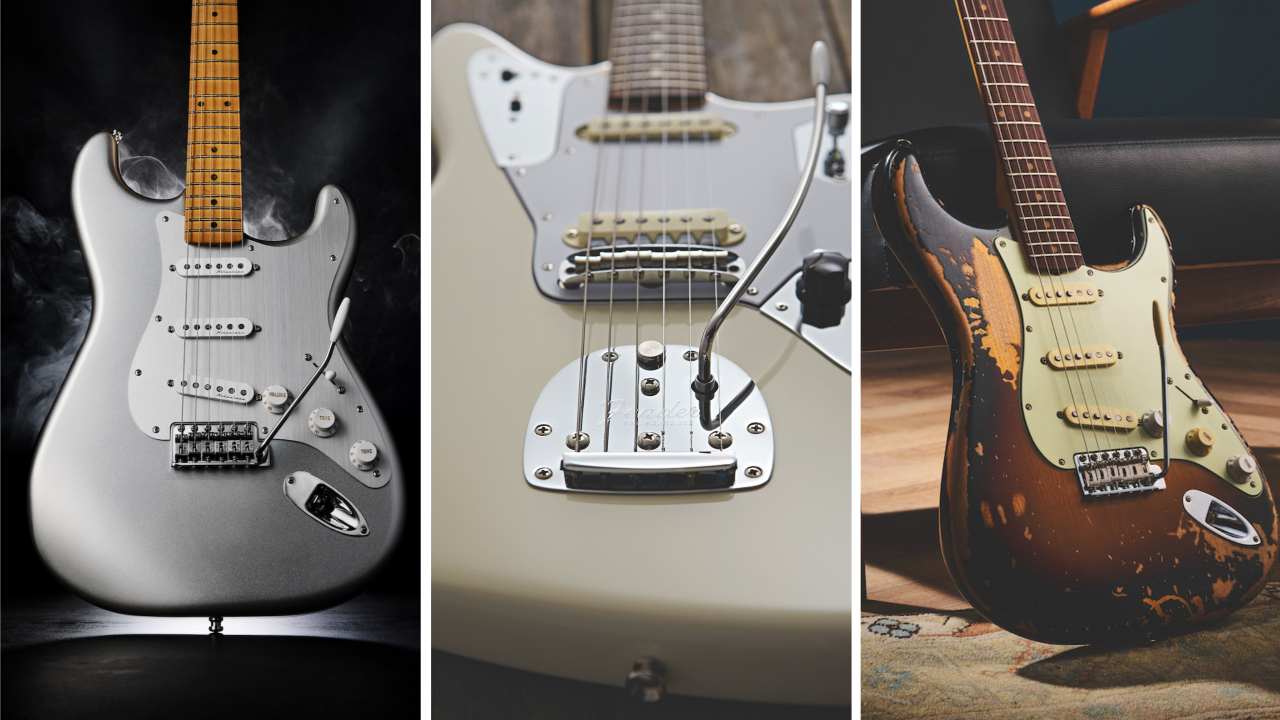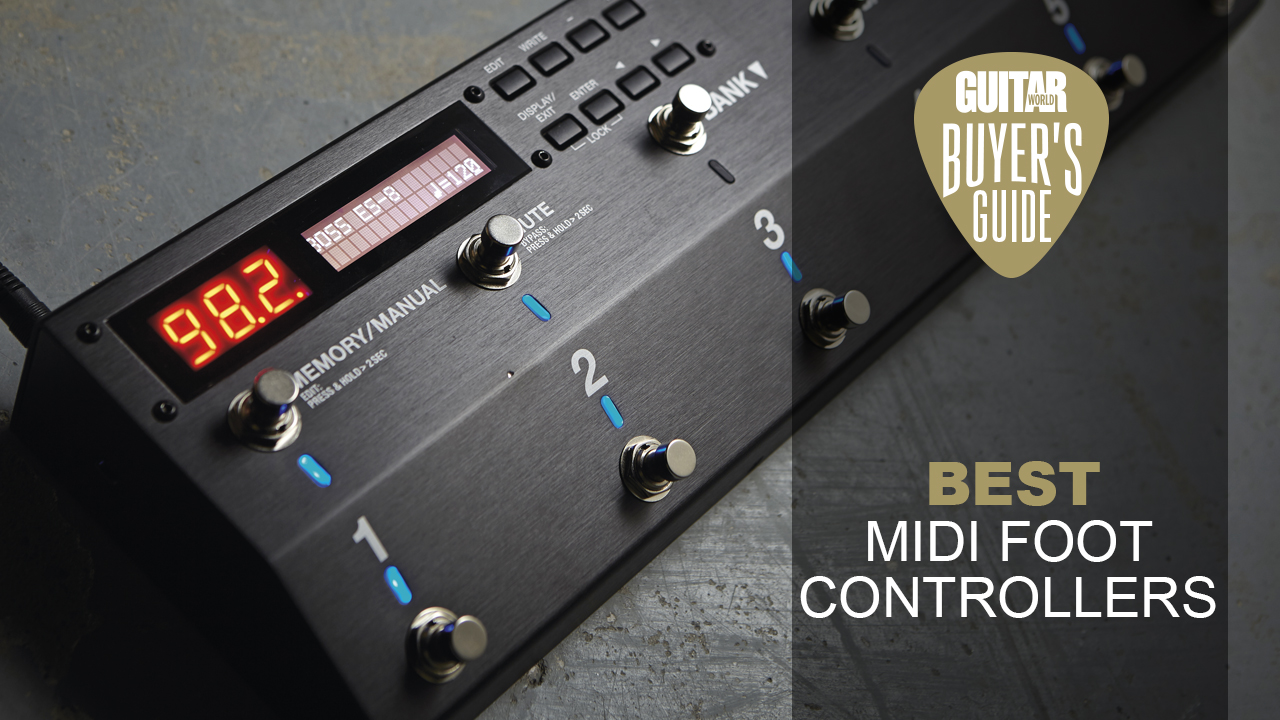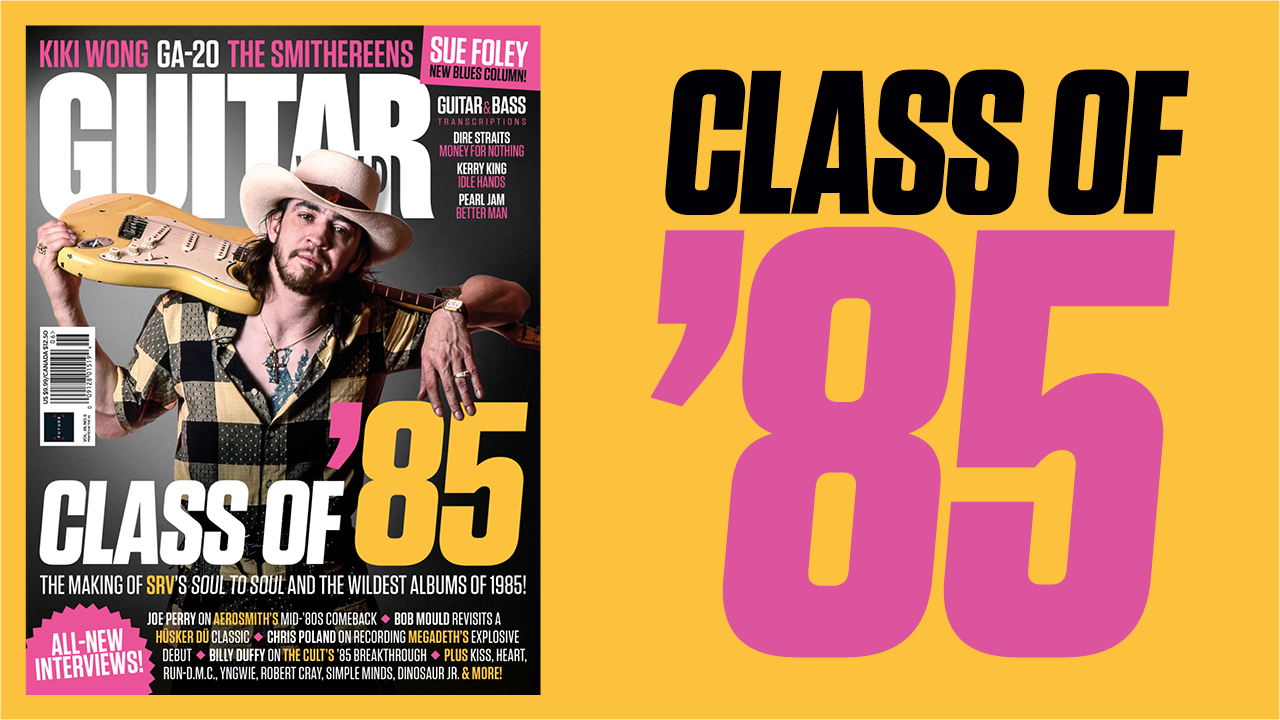Best metal guitars 2025: hell-raising electrics for shredders on any budget
From extended-range guitars to Flying Vs, here's our pick of killer metal guitars from Jackson, ESP, Ibanez, Strandberg and more
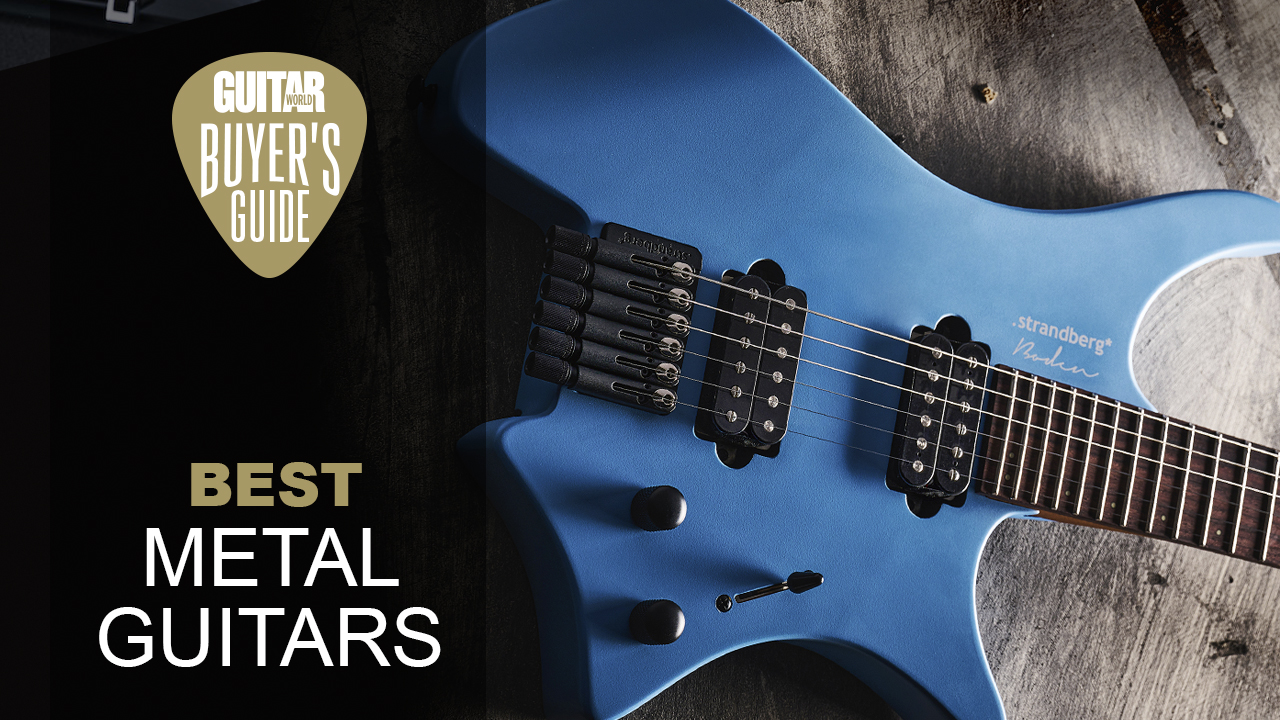
You might think that you can play metal on any guitar and to some extent, you are right. Iron Maiden manages just fine with Stratocasters, so it’s not necessarily the case that you need an all-black angular axe with two high-output humbuckers to play heavy. That said, the best metal guitars tend to be specifically geared for playing in the genre, namely savagely heavy riffs, lightning-fast playability, and often a particularly dark aesthetic.
Whether you’re looking for a metal guitar for death metal, black metal, metalcore, or any of the numerous subgenres this wide and varied style of music contains, you’ll find one for your needs in this guide. We’ve reviewed countless metal guitars over the years, putting them through their paces across a variety of playing techniques from power chord-laden thrash riffs all the way through to drop-E tuned djent staccato breakdowns.
Over twenty years of playing in heavy bands means we’ve got a lot of experience, so if you’re new to the genre of metal or just metal guitars in general, make sure you check out our FAQs. For those who already know the difference between a Fishman Fluence and a Floyd Rose, keep scrolling to see our top picks…
Best metal guitars: Quick list
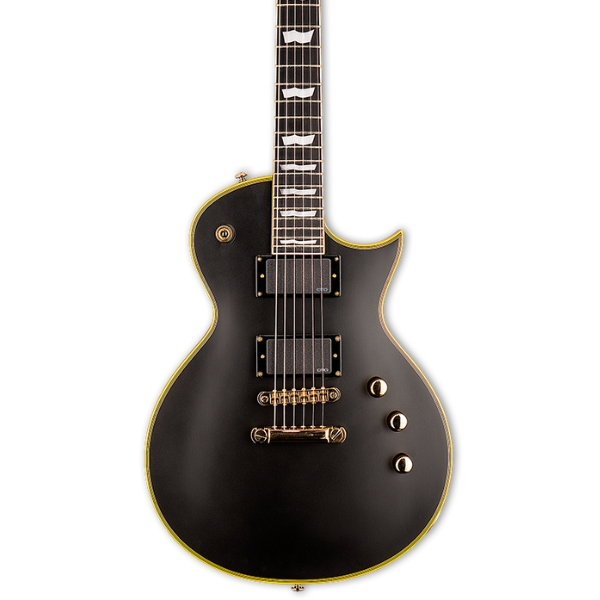
The ESP LTD EC-1000 is one of the most common guitars on the metal gigging circuit, combining playability with tonal versatility to cover pretty much any style of metal you can think of.
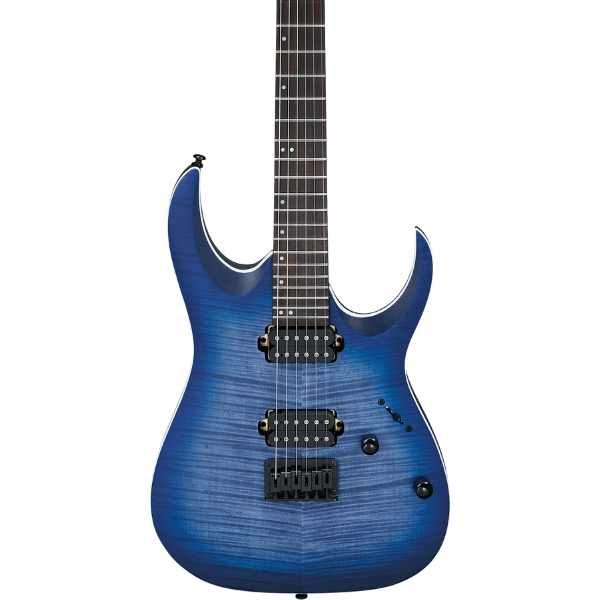
If you want a guitar that lets you get heavy without spending loads of cash, the Ibanez RGA42FM will hit the mark with its excellent playability, great-sounding pickups, and decidedly metal aesthetic.
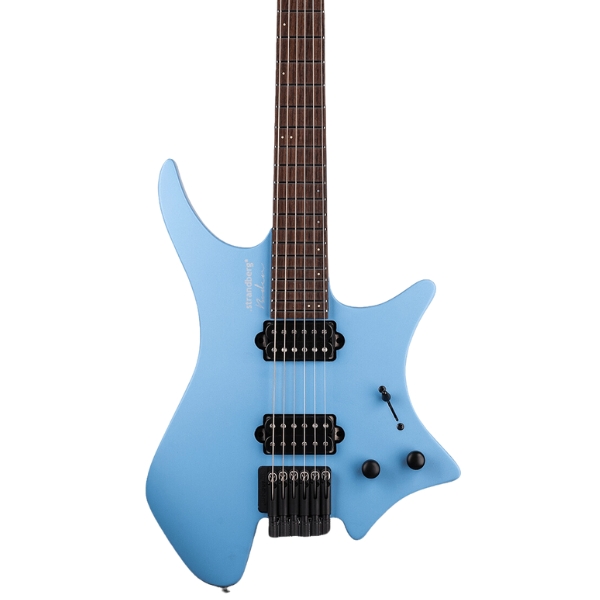
If you're looking to play rapid-fire shred licks, the Strandberg Boden Essential is one of the fastest-playing guitars money can buy. A versatile pickup configuration means it can cover a lot of ground too.
Best overall

1. ESP LTD EC-1000
Our expert review:
Specifications
Reasons to buy
Reasons to avoid
✅ Buy if you want a great value all-rounder: There's a reason you see heavy bands using the EC-1000 so often. It's versatile, well-built, and excellent value for money.
❌ Avoid if you want a shred guitar: As it's more traditional in its design, it isn't the fastest-playing or sleekest guitar out there.
With Fishman’s Modern Fluence humbuckers, ESP/LTD’s flagship single cut can perform metal of all eras. The switching is all very state-of-the-art, with push/pull coil-split for single-coil tones and enough firepower to add serious weight to your riffs.
The Tune-O-Matic bridge offers a fuss-free performance, plenty of sustain, and a solid platform for your punishing right-hand attack, but we wouldn’t want you to think of this only for rhythm.
The thin-U neck is an exceptional profile for lightning leads, with the extra-jumbo frets and 13.8” radius providing us an easy ride up to the top end of the fretboard during testing, where you’ll find a neatly sculpted heel. Oh, and the finish is incredible. It’s called Violet Andromeda and looks different depending on how the light hits it.
Read our full ESP LTD EC-1000 review
Best budget
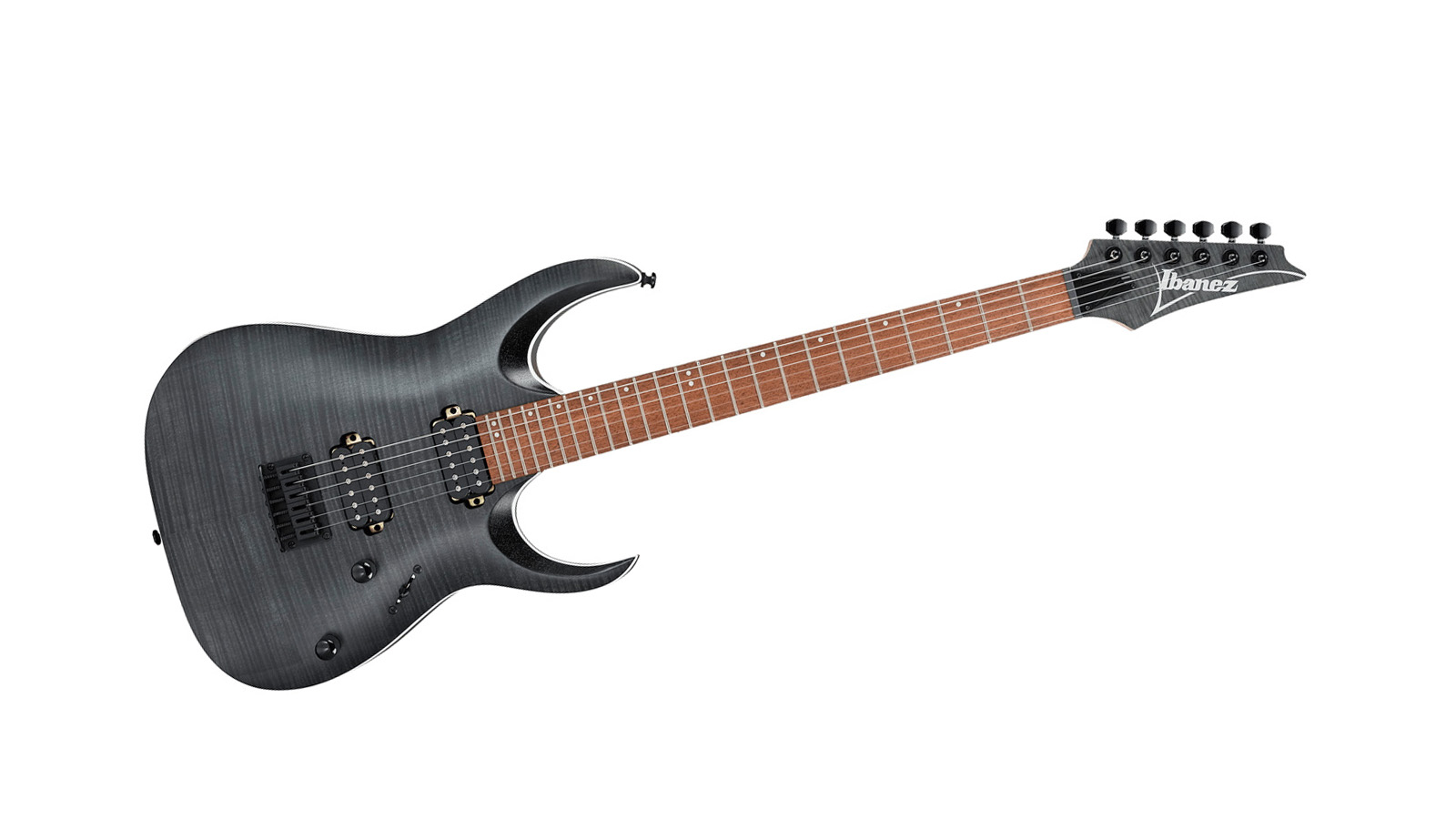
2. Ibanez Standard RGA42FM
Our expert review:
Specifications
Reasons to buy
Reasons to avoid
✅ Buy if you want a metal guitar on a budget: The RGA42FM is phenomenal value for money, making it perfect for beginner players or those who need a reliable backup.
❌ Avoid if you want versatile tones: The budget pickups here do a great job on metal tones, but they don't have as much depth as other, more expensive models.
Ibanez’s RG series was launched in 1987 and with sharp horns, thoughtful body contouring, and being a testing ground for the super-svelte Wizard neck profiles, it fast cemented itself as one of the world’s favorite S-styles.
You can find the RG at all prices but the stripped-down model is very financially accessible. It has a speedy Wizard III maple neck, measuring just 19mm thick at the first fret and only 21mm at the 12th.
Okay, it doesn’t have a Floyd Rose tremolo, the hard-tail format is a good stable platform, ideal for aspiring shredders who don’t yet want to worry about spending time adjusting their bridge. The 5-way blade selector offers a wide sweep of humbucker and split-coil tones.
Best for shred
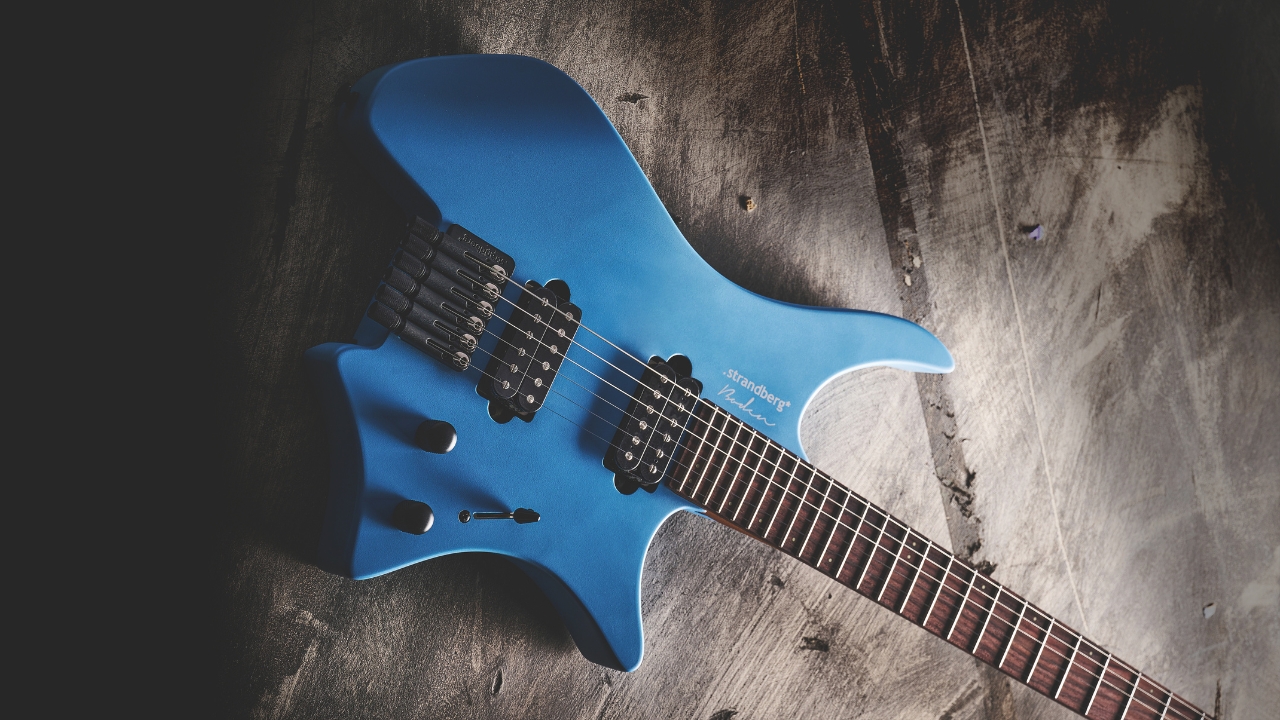
3. Strandberg Boden Essential
Our expert review:
Specifications
Reasons to buy
Reasons to avoid
✅ Buy if you want to shred: With its ultra-fast playing neck and silky smooth ergonomics, this is the perfect guitar for those who like their metal avant garde.
❌ Avoid if you like traditional necks: The Strandberg neck profile is very unusual, and can take some getting used to if you've never played one before.
Looking very much like the future of the electric guitar, the Strandberg Boden Essential is our top pick for all the shredders out there. For a long time, Strandberg solely catered to the higher echelons of the guitar market, but the Essential is here to give us regular metal guitarists a taste of the future.
Although it’s going to appeal to shredders and those who like their metal more eclectic, it’s a really adaptable guitar that can do everything from Strat-spank to full-on mid-range gut punch. The two OEM humbuckers paired with a 5-way switch ensure you’ll have more than enough tones onboard for clean passages, djent-y rhythms, and soaring lead tones.
The EndurNeck features a very unique profile that really has to be felt to be believed. The idea is that it gives you a bigger space to place your thumb, thus keeping your wrist straighter and promoting better technique. One thing we can attest to is that you can absolutely rip on that Rosewood fretboard, and although it takes some getting used to, once you’ve warmed up to it you’ll never want to go back to a regular profile guitar neck.
Read our full Strandberg Boden Essential review
Best 7-string
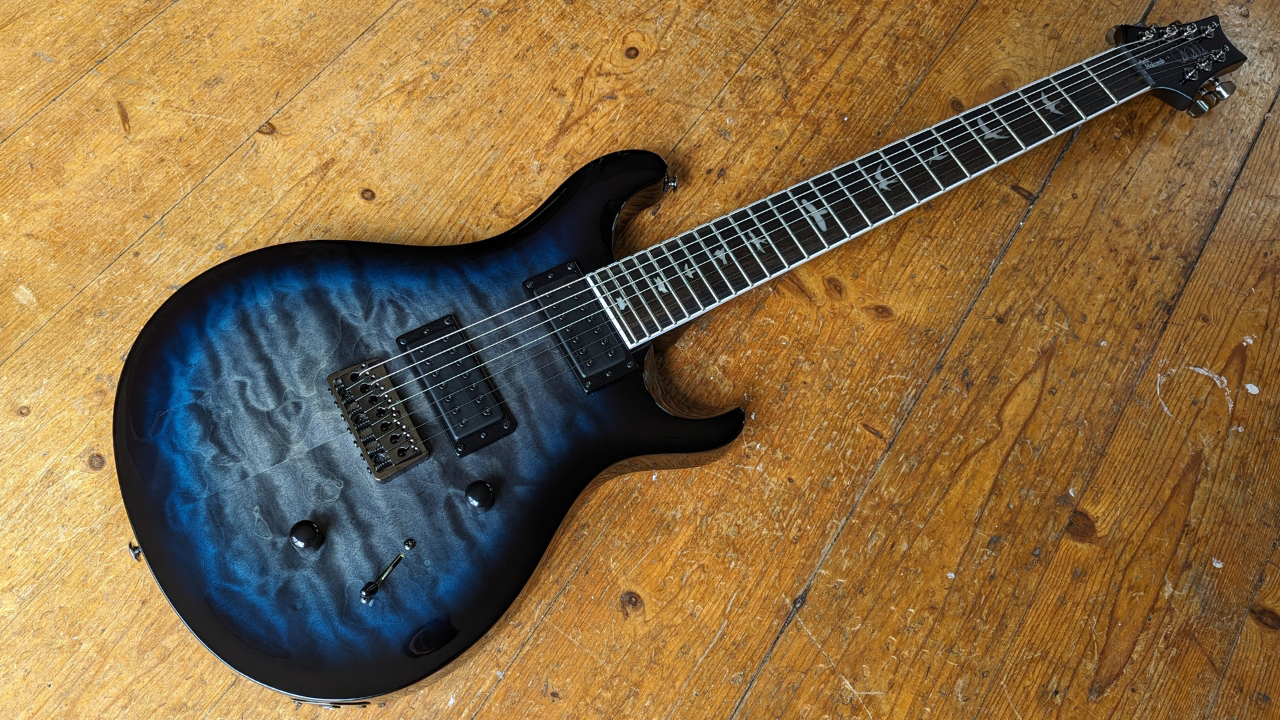
4. PRS SE Mark Holcomb SVN
Our expert review:
Specifications
Reasons to buy
Reasons to avoid
✅ Buy if you like prog metal: With its versatile pickups and extended range, the Holcomb SVN is perfect for prog-metallers who need heavy riffs with good cleans.
❌ Avoid if you like high output pickups: The pickups on this guitar are less hot than you'd expect, particularly the neck, so avoid if you prefer a more intense sound.
As one-third of Periphery’s three guitar assault, Mark Holcomb certainly knows a thing or two about drop-tuned riffing. His signature PRS SE Mark Holcomb SVN is just as versatile as Mark’s own playing is, giving you savage downtuned distorted riffs alongside crystal clear cleans.
With a Seymour Duncan Scourge in the bridge and Seymour Duncan Scarlet in the neck, you’ve got a surprisingly versatile set of pickups that aren't quite as 'hot' as you'd expect from a metal guitar. The bridge is aggressive sounding, but the neck pickup delivers excellent clean tones with the addition of a push/pull coil split to give you even more options.
The longer scale length will take some getting used to if you’ve never played one before, and for those with smaller hands, the first five frets could end up feeling monstrous. PRS’s neck profile is also slightly different from other guitars, but we found it ultra-comfortable here, at times forgetting we were playing a guitar with an extra string!
Read our full PRS SE Mark Holcomb SVN review
Best 8-string
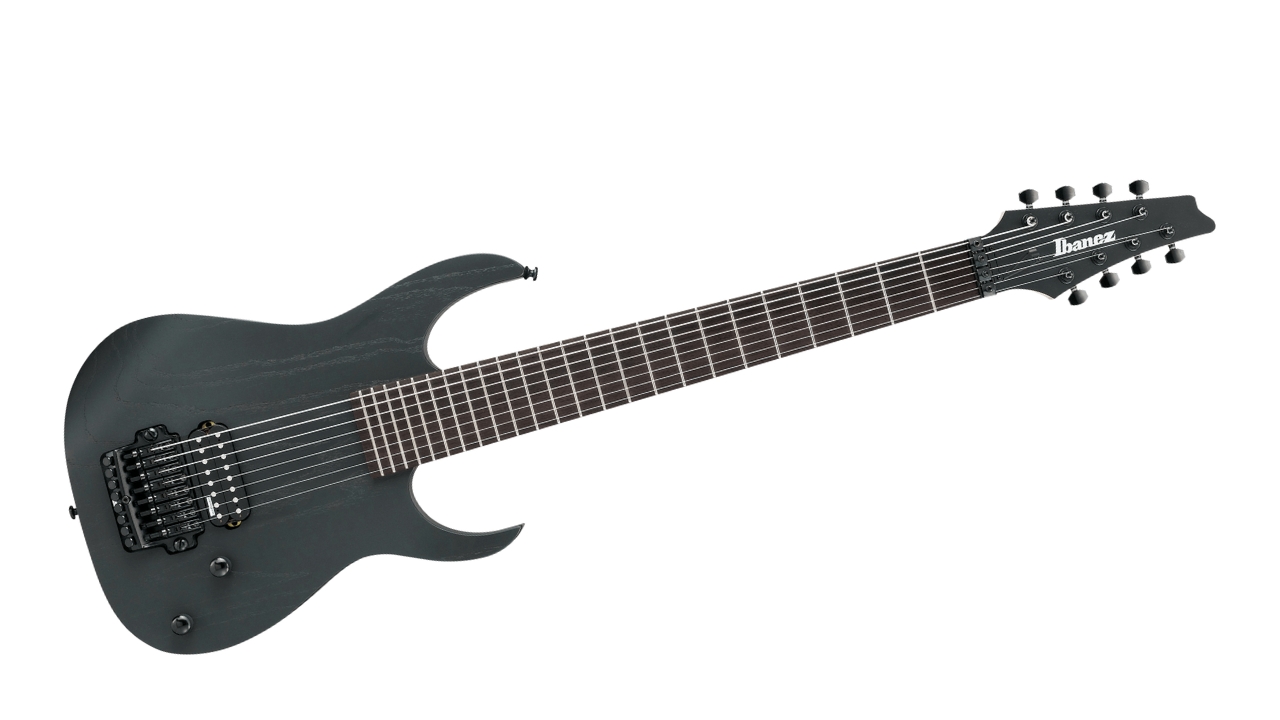
5. Ibanez Meshuggah Signature M80M
Our expert review:
Specifications
Reasons to buy
Reasons to avoid
✅ Buy if you want ultra-low tunings: With a huge 29.4" scale and 8 strings, you can take the Ibanez M80M down to drop-E if you want.
❌ Avoid if you want easy playability: 8-string guitars are already difficult to master and that's before you take into account the ginormous scale length.
Made for the band that popularised ultra-low tunings and extended-range guitars, it makes total sense that the Ibanez Meshuggah Signature M80M is our top pick for an 8-string guitar. It’s not subtle, but if you want the lowest of the low riffing, this is the guitar to go for.
The bonkers 29.4-inch scale length takes it close to bass guitar territory, and ensures that it plays great no matter how low you go. It’ll take some getting to used to if you’re coming from a regular scale guitar, but once you get over that initial period you’ll find it’s brilliant for those syncopated riffs and lightning-fast leads Meshuggah is renowned for.
It’s a big instrument and you’ll feel that resonance when you play it unplugged. The star of the show here though is that Lundgren humbucker, the gold standard for extended-range guitars. It's brilliantly articulate even on the lower strings, giving you plenty of ability to cut through the mix.
Best baritone
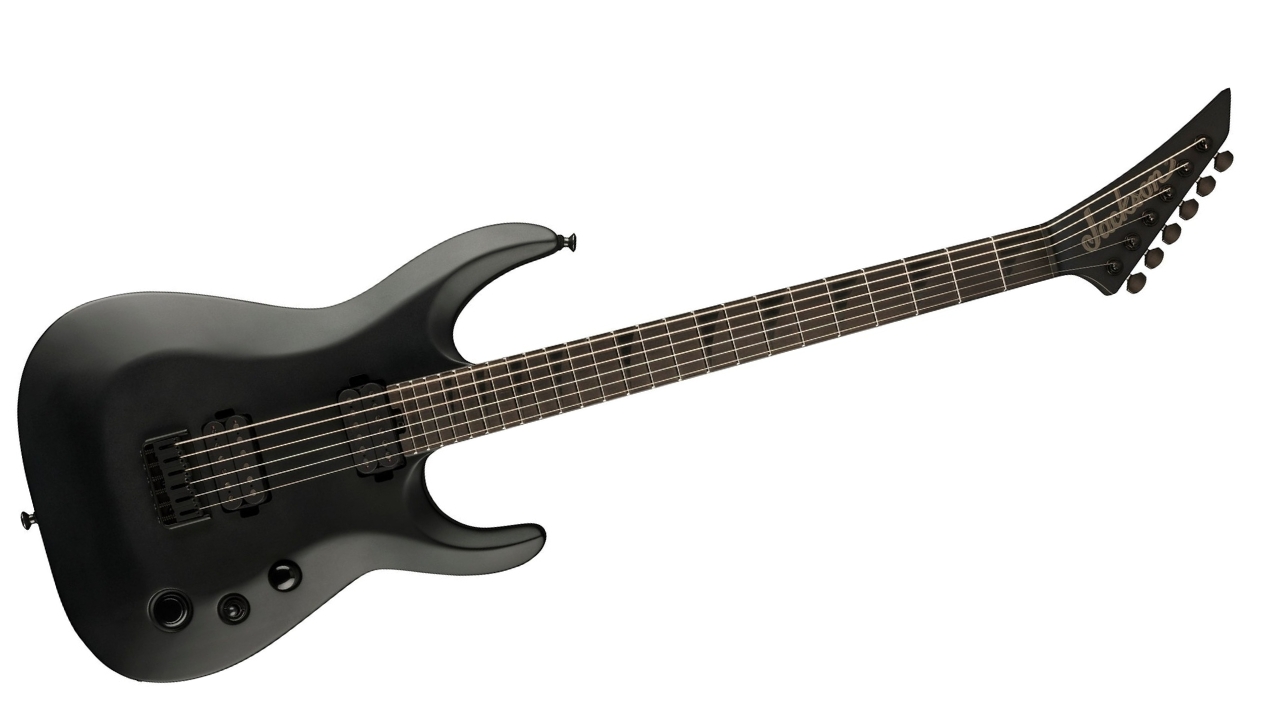
Specifications
Reasons to buy
Reasons to avoid
✅ Buy if you want low tunings with six-string playability: This baritone will get you down to drop-F with the right strings, whilst retaining those familiar scale patterns and chord shapes.
❌ Avoid if you've got small hands: With a 27-inch scale, reaching from the 1st fret to the 5th will feel massive on this guitar and takes some getting used to.
Available in black and absolutely nothing else, the Jackson Pro Plus XT Soloist Baritone is perfect for guitarists who want to get low but don’t want to deal with the extra strings of a typical extended-range guitar. Modern baritones are great for all sorts of metal, as you can take them down to the lowest tunings while keeping all your chord and scale shapes the same.
With two of Seymour Duncan’s most metal pickups, the Nazgul and the Sentient, you’ve got the perfect pair for ultra-low riffing that still retains a lot of clarity. The neck pickup is claimed to be more ‘vintage’ but we found it to be very high output and perfect for silky smooth lead work or clean-picked arpeggios.
Locking tuners provide excellent stability and rapid-fire string changes if you happen to chug a little too hard, and the hardtail bridge makes it a very stable guitar even if you’re tuning down to F. The arcade button kill switch is a nice touch too, and great for adding stutter effects during a crushing breakdown or livening up your lead work.
Read our full Jackson Pro Plus XT Soloist SLAT HT6 Baritone review
More options...
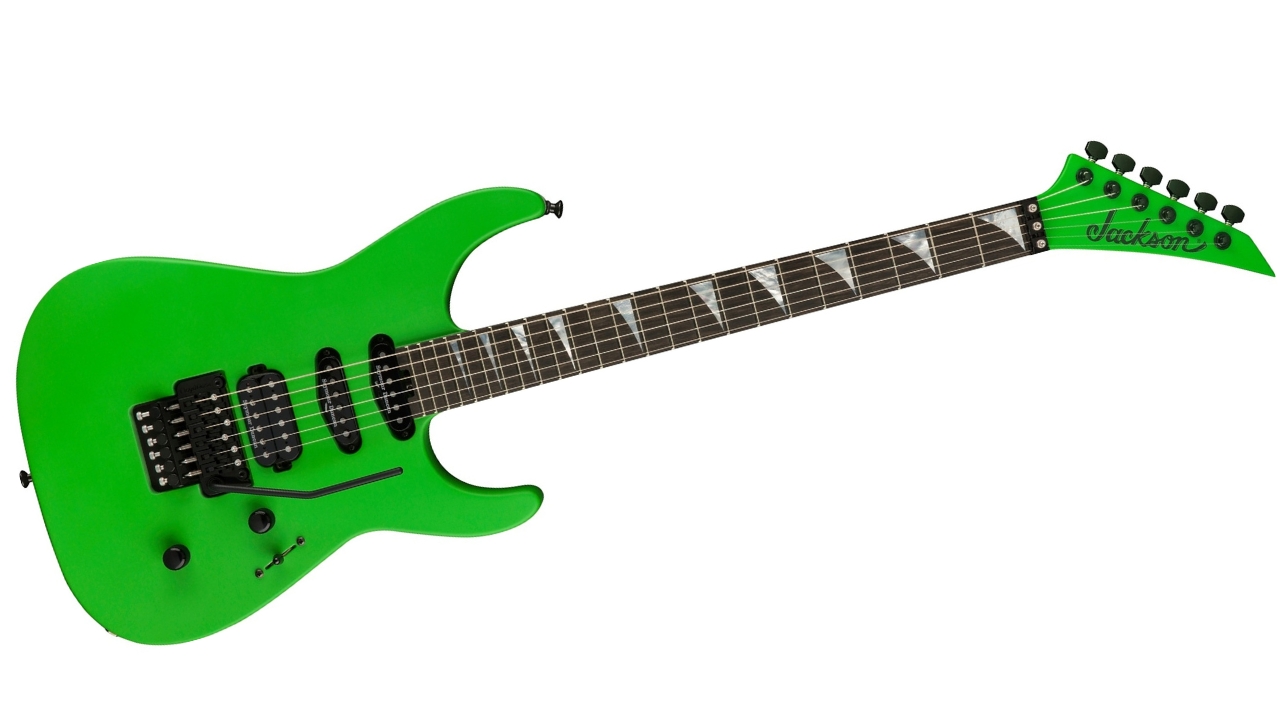
7. Jackson American Series Soloist SL3
Our expert review:
Specifications
Reasons to buy
Reasons to avoid
✅ Buy if you want ultra-fast playability: With its ultra-rigid neck and flat fingerboard profile, the Soloist SL3 is perfect for shred licks.
❌ Avoid if you're on a budget: This instrument is made in the USA and features Seymour Duncan pickups, so comes with a significant price tag attached to it.
The Jackson American Series Soloist SL3 is a premium guitar for metal that plays as fast as it looks. Featuring a host of premium features plus quality USA-made craftsmanship it’s not just for shredders either, with a pickup configuration that makes it more versatile than you’d think.
With a Seymour Duncan JB in the bridge position, it comes as no surprise to find this guitar excels at distorted guitar tones. It delivers excellent sustain and a full-bodied tone, that will immediately make you want to shred. Despite this, you can still get some pretty Strat-esque sounds from the single coil pickups, with plenty of spanky tones if you need them.
The neck on this guitar is joyous thanks to its ultra-rigidity and flat radius. Graphite shafts flank the truss rod providing an excellent playing platform with no hint of movement from the neck. The Floyd Rose feels nice and solid with corrosion-resistant bolts that ensure the system will keep operating perfectly for years and years.
Read our full Jackson American Series Soloist SL3 review
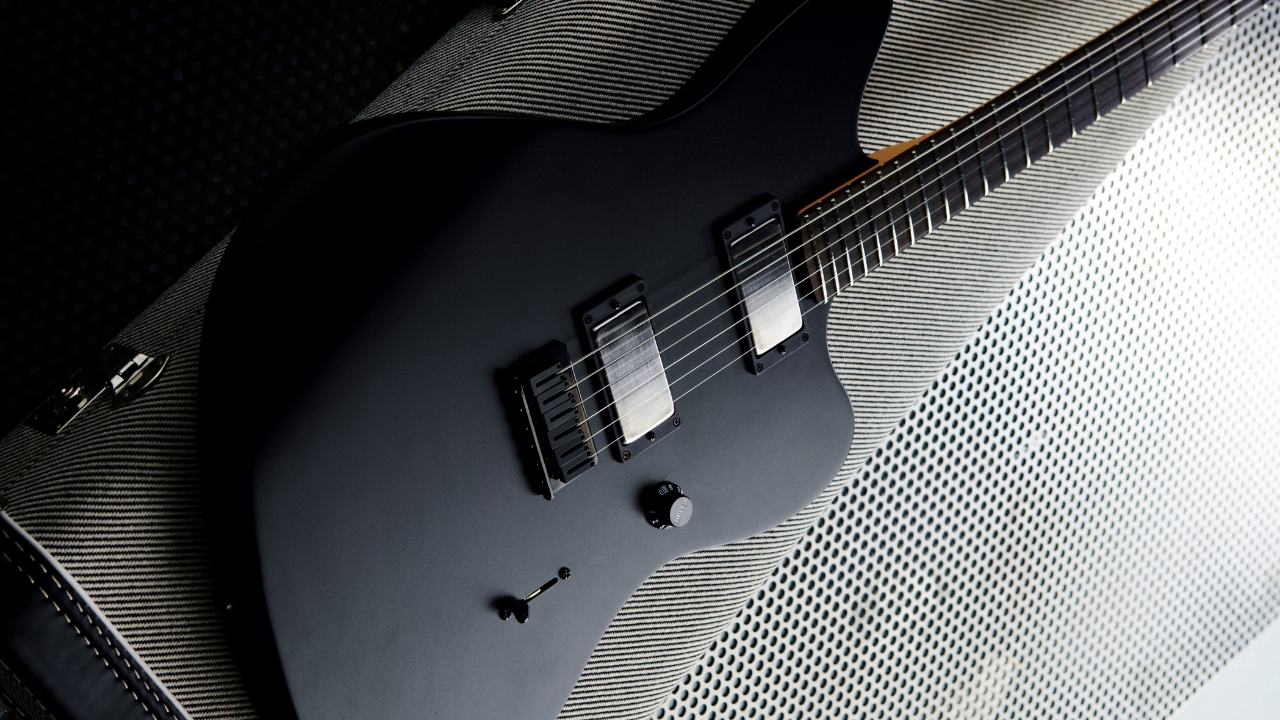
8. Fender Jim Root Jazzmaster V4
Our expert review:
Specifications
Reasons to buy
Reasons to avoid
✅ Buy if you want a traditional guitar geared for metal: With its traditional Jazzmaster body, on the surface this guitar looks very traditional, but those pickups are capable of unleashing proper metal tones.
❌ Avoid if you like more versatility: It's a simple guitar with just a master volume knob and three-way pickup selector, so may not suit those who like versatile guitars.
Jim Root has always liked to take a classic Fender design and gear it up for war. What he has done with his new Jazzmaster is like taking an old station wagon and fitting a surface-to-air missile launcher on the hood.
Here we’re dealing with a non-traditional and heavier-weighted mahogany body. The controls have been pared down to the essentials, including a three-way blade switch choosing between his active EMG Daemonum pickups or both, with only a master volume and no tone.
The result is a guitar that is Jazzmaster in profile only, a retro-profiled offset with a voice that has a more solid low-end, with bright mids and highs that really begin to sing once the gain is past two o’clock.
Read our full Fender Jim Root Jazzmaster V4 review
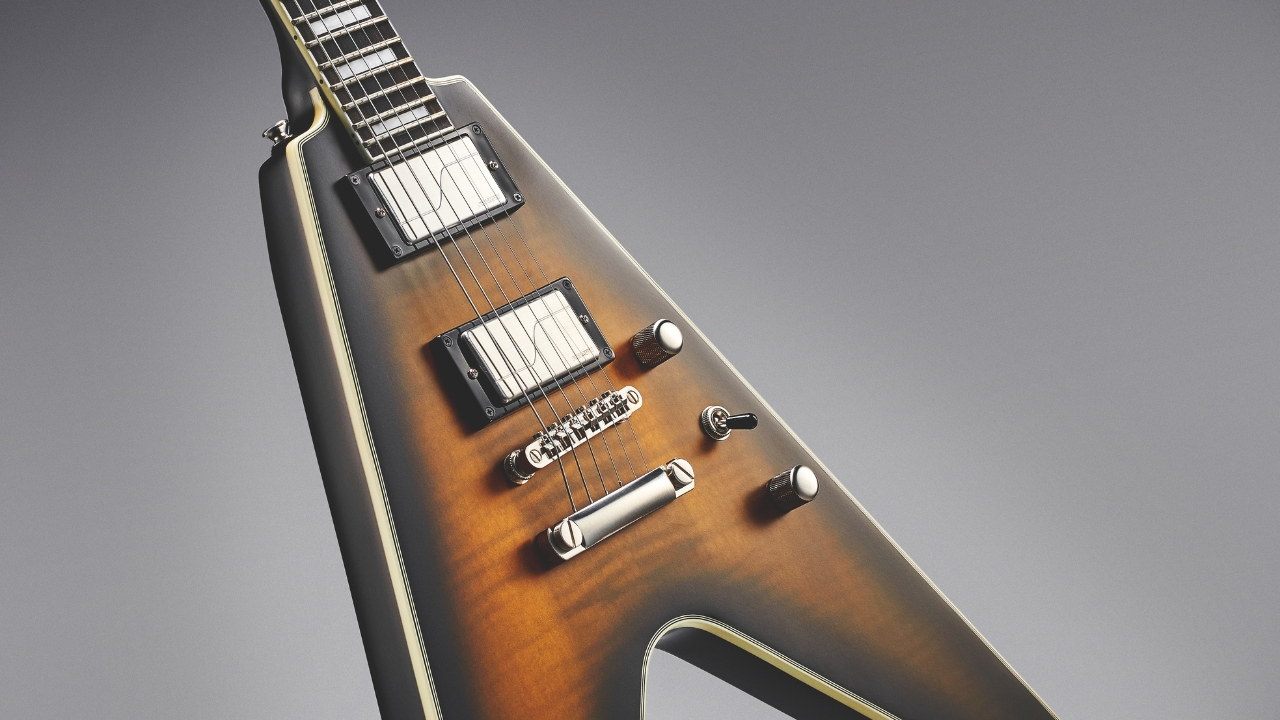
9. Epiphone Prophecy Flying V
Our expert review:
Specifications
Reasons to buy
Reasons to avoid
✅ Buy if you want a metal guitar for live shows: Flying V guitars are meant to be played on stage, so if you're a regularly gigging player this is a great guitar for you.
❌ Avoid if you're a bedroom player: Despite looking so damn cool, V-shaped guitars are totally impractical for playing sitting down at home.
Epiphone’s Prophecy range of guitars drags classic designs kicking and screaming into the 21st century - and scream they do. The Prophecy Flying V is, simply put, a total monster. Specs-wise, it’s overflowing with high-end accouterments, from the asymmetrical neck profile to the sophisticated Fishman Fluence custom-voiced humbuckers.
You’ll notice the push-pull volume and tone pots don’t have the standard ‘coil-split’ function of most other guitars. That’s thanks to the Fluence humbuckers being just that bit cleverer than most, toggling between a high-output modern humbucker and a classic Burstbucker/PAF-style voicing. In terms of metal, this guitar can cover virtually any style you can throw at it - we discovered during our testing that it can do beautiful cleans, too.
To be fair, we’d have liked the option of a Prophecy model with a pair of passive humbuckers like Epiphone has done with past models, but we really can’t complain. You get a lot for your money with this Flying V.
Read our full Epiphone Prophecy Flying V review
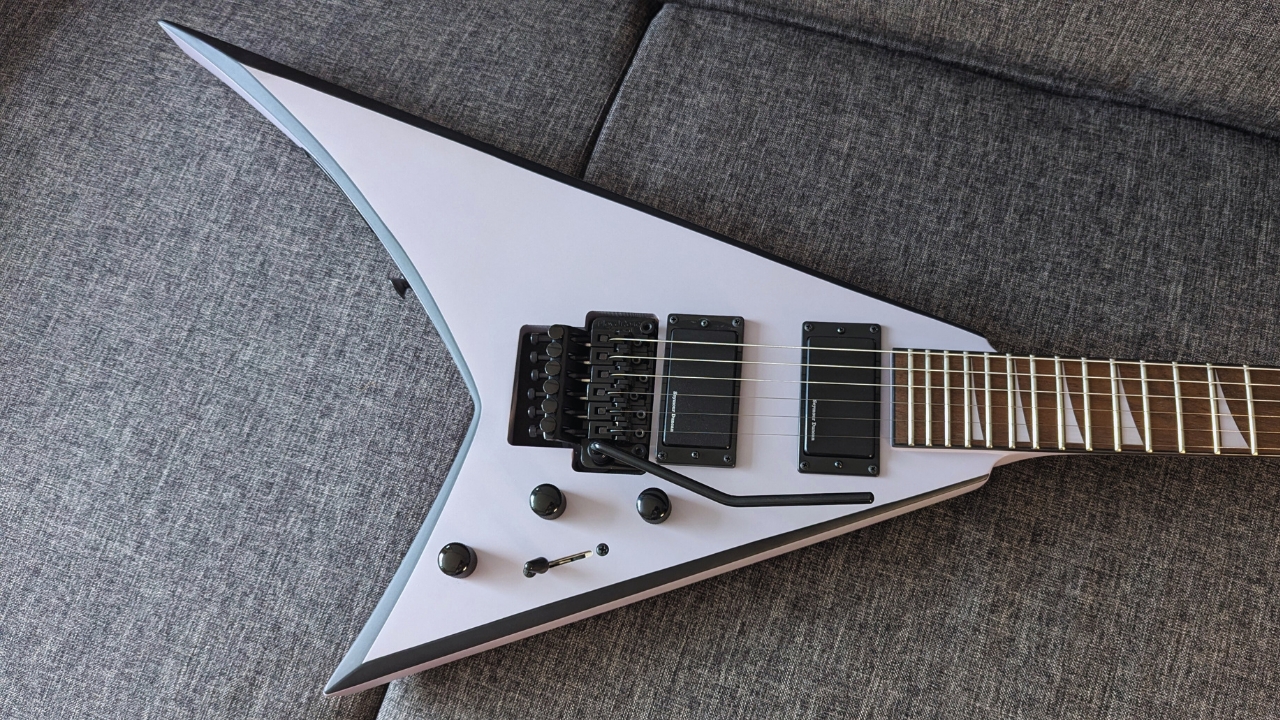
10. Jackson X Series Rhoads RRX24
Our expert review:
Specifications
Reasons to buy
Reasons to avoid
✅ Buy if you want a more modern 'V' guitar: The RRX24 is very much a modern metal guitar with its all-black design, active pickups, and locking tremolo.
❌ Avoid if you want to play sitting down: As with all 'V' guitars, they're predominantly designed to be played standing up.
There have been countless versions of Jackson’s über-pointy Randy Rhoads V over the years but this X Series Rhoads - new for 2020 - might just skewer the dragon in terms of value and on-message style.
It’s black-on-black, with a reverse six-in-line headstock for added metal points. You could pay $30-odd bucks more and get one with Neon Pink or Neon Green bevels if you need some color. It’s a super-aggressive silhouette but has been around long enough to be a classic.
But the key here is its playability. We found during testing that while it's not great while seated, it's awesome standing up. It is typically shreddable with the dual active pickups from Seymour Duncan providing a super-hot performance that will deliver the goods big-style. And there’s a Floyd.
Read our full Jackson X Series Rhoads RRX24 review
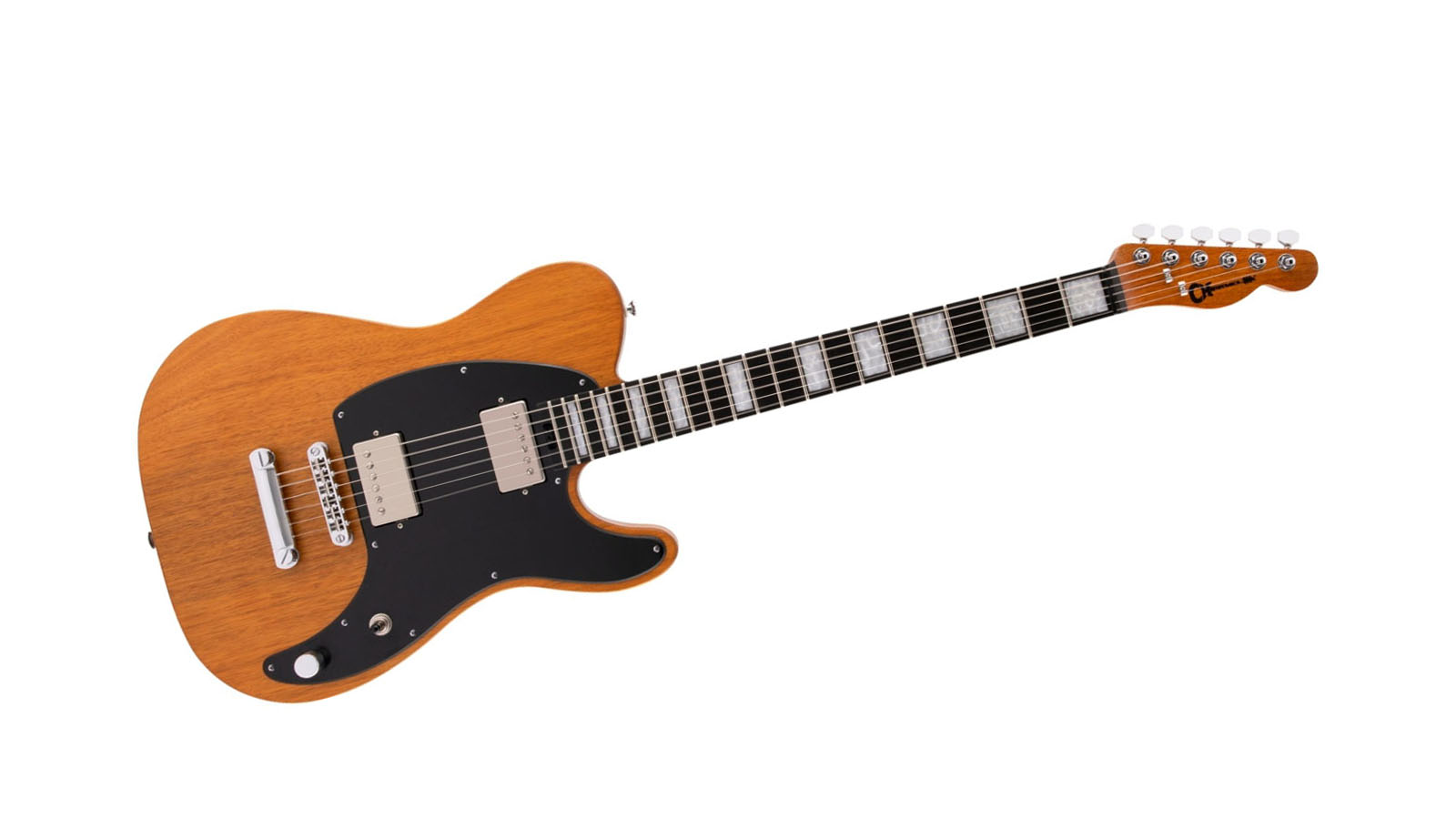
11. Charvel Pro-Mod Joe Duplantier San Dimas Style 2
Our expert review:
Specifications
Reasons to buy
Reasons to avoid
✅ Buy if you want a metal guitar with a traditional design: On the face of it, this signature Charvel looks much more like a traditional Telecaster than the metal machine it really is.
❌ Avoid if you like the metal aesthetic: Conversely if you're into spiky shapes and a none-more-black ethos, this probably won't do the job for you.
The evolution of the Gojira riff-master’s signature San Dimas Style 2 continues apace, and this one, unveiled at NAMM 2020, is the classiest-looking yet. The black guard is nice, too, especially if you have moseyed on over here from using a ‘50s Telecaster and want to tune down and bang some heads.
The playability is incredible. Charvel is the original hot rodder, and we found, during testing, that the 12-16” fingerboard radius across its more recent models is supremely comfortable for fretting chords and sweeping up arpeggios alike. There is a Charvel Speed Shape profile that’s joined to the body with a four-bolt heel.
But it’s the pickups that have got us really sold on this. Duplantier’s signature DiMarzio is the hotter of the two, perfect for articulating down-tuned riffs that are saturated in gain, while the PAF 36th Anniversary shoots for the Holy Grail of ’59 Les Paul tones.
Read our full Charvel Pro-Mod Joe Duplantier San Dimas Style 2 review
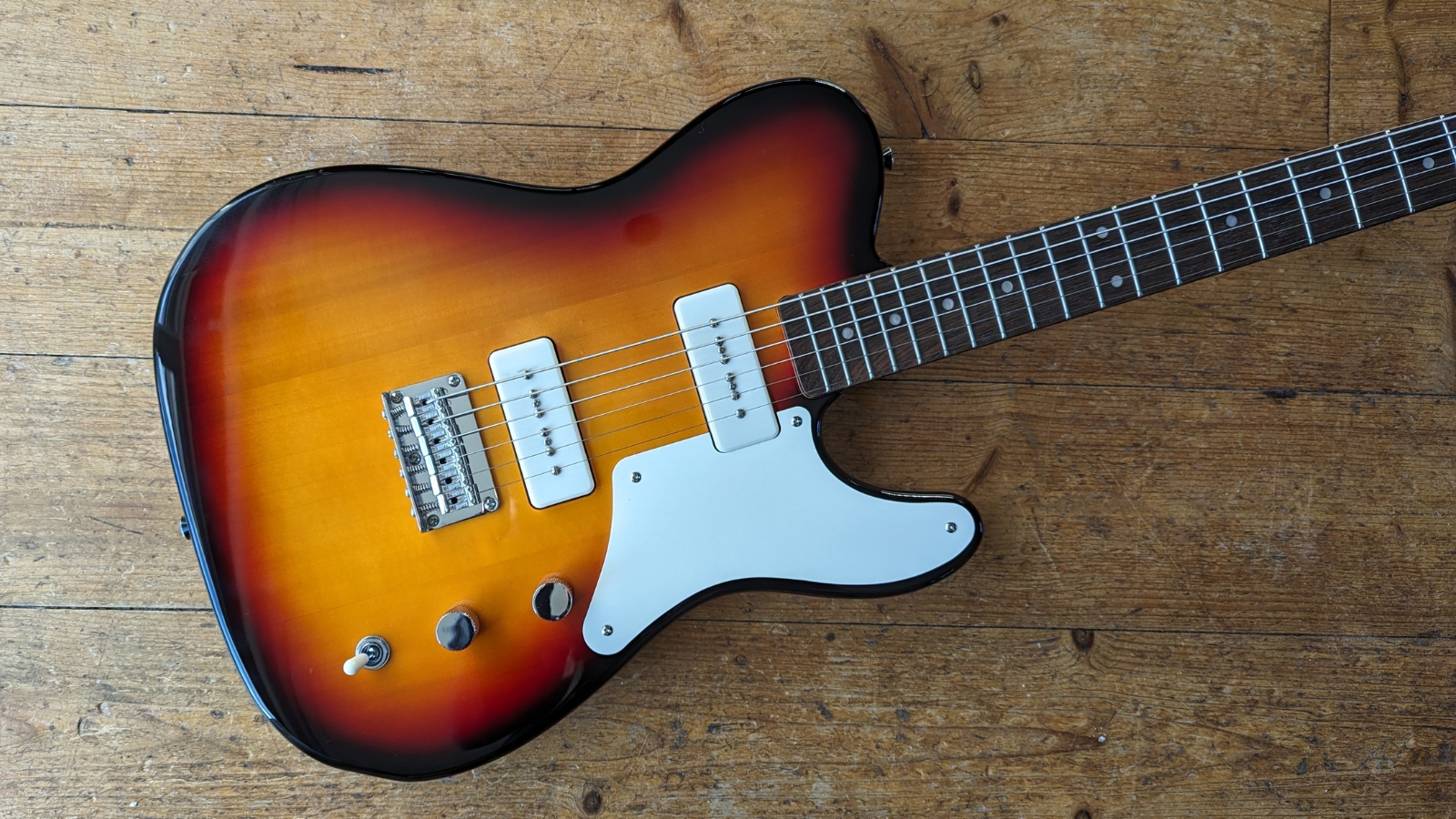
12. Squier Paranormal Baritone Cabronita Telecaster
Our expert review:
Specifications
Reasons to buy
Reasons to avoid
✅ Buy if you want a great value baritone: It may look like a classic Telecaster, but it can most definitely djent with the more metal-looking guitars out there, and it's phenomenal value for money.
❌ Avoid if you like active pickups: This Squier features two soapbar pickups, which are pretty far from the active pickups you normally find in modern metal guitars.
A rather unsuspecting option for the best metal guitar, but it works. The soapbar pickups might not dish out the same sort of saturation as a pair of active humbuckers, but they’ve got a really nice growl and mid-range bump that helps them cut through a mix. They distort nicely, plus they cover a range of different tones. If you’re one for bringing in clean breaks and intros, then this guitar is ideal.
The 27” scale helps cater for the B to B tuning as standard and really helps deliver some wall-rumbling low end. It’s great for serving up big, mean-sounding riffs. Plus, with Squier’s great build quality and affordable pricing, you get a lot for your money. The Tele is also a classic body shape and is easy to play in any situation!
Read our full Squier Paranormal Baritone Cabronita Telecaster review
FAQs
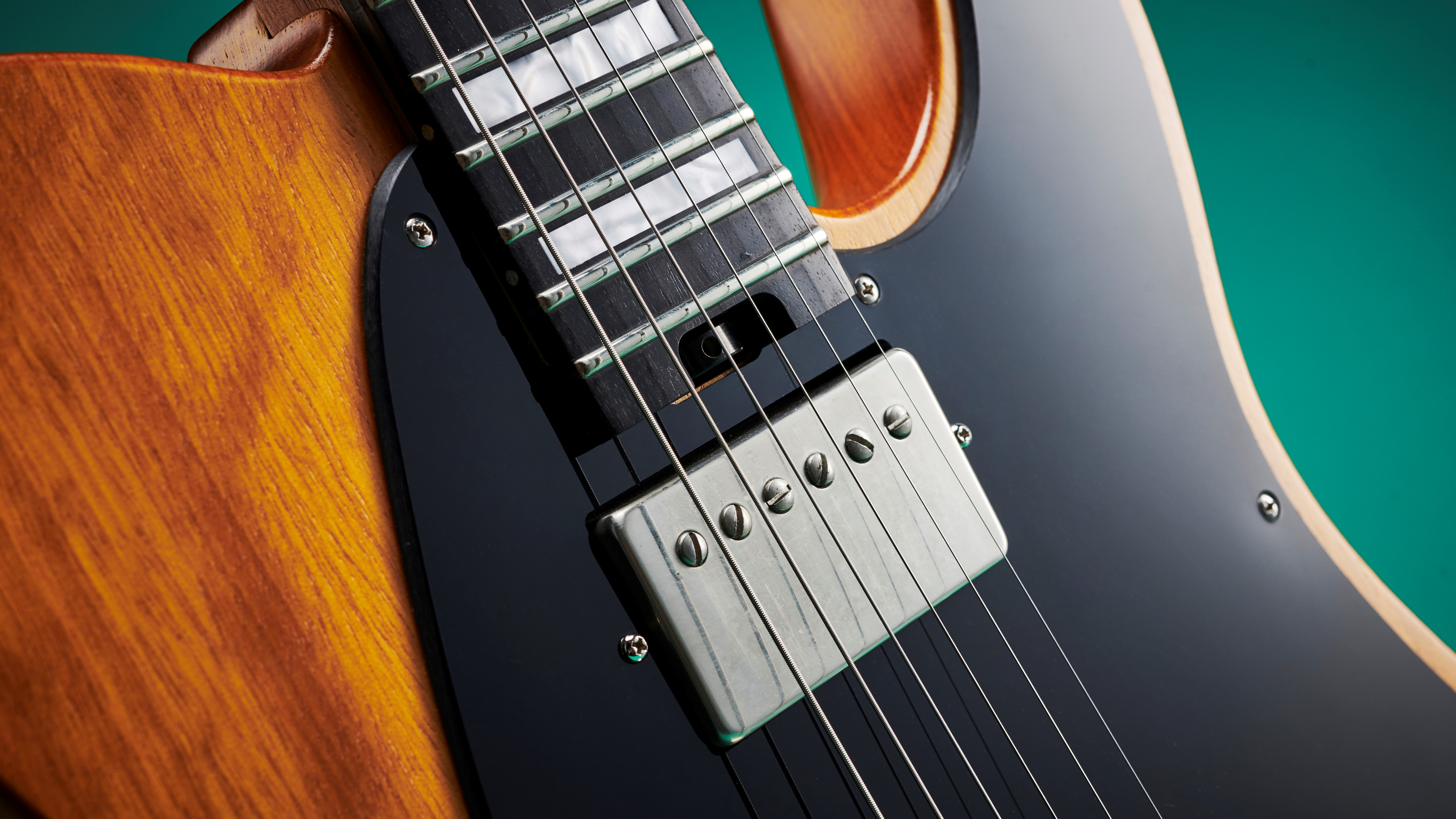
Do I need a specific metal guitar to play metal?
Contrary to popular belief, no - you do not need a specific metal guitar to play metal. Having a guitar that's up to the job definitely helps you achieve the crazy gain tones you're after, but you don't need any specific type of guitar to do this. Sometimes, single-coil pickups sound killer in a metal setting. It's all about experimenting with tones and seeing what you like.
But, for that super-heavy, drowning-in-gain tones you’re after, one of the best metal guitars is designed specifically to make your life easier. The hardware, electronics, necks, fingerboards, and bodies are all built specifically to draw out the best metal tones possible from that guitar - and who doesn’t want a purpose-built shred machine?
What are the best brands for metal guitars?
Most guitar brands make instruments specced out for metal, but there are definitely a few firm favorites that you’ll see onstage more often than others. ESP, Schecter, Ibanez, and Jackson are the ones that spring immediately to mind. Playing metal demands a lot from your instrument and these brands all make some epic high-output axes that will play fast and let you get heavy.
So why don’t big brands like Fender and Gibson make metal guitars? We reckon it’s because they both own sub-brands where they can better market axes catered towards the metal player. Fender owns Jackson and Charvel, who both make loads of extreme, pointy-shaped guitars, whereas Gibson has both Epiphone and Kramer where they can manufacture instruments for metal.
Are 7-string or 8-string guitars better for metal music?
It all depends on what you want to play really. If you’re into more traditional forms of metal like thrash, heavy metal, power metal, or hair metal then a six-string instrument will likely do the job for you. You can tune it down if you want to get heavier, but it’s not a must-have as you’ll likely be playing closer to standard tuning.
If you’re into more modern metalcore, djent, or progressive metal, then an extended-range 7-string guitar or 8-string guitar is definitely the way to go. It gives you that super low end and these guitars usually feature longer scale lengths to deal with lower tunings. You also get the ‘regular’ range of a guitar, but it will take some getting used to thanks to the extra string.
If you’d like to keep the playability of a regular six-string but still want to tune low, then you should have a look at the best baritone guitars. These guitars feature a longer scale but keep the six strings, so you can still play open chords as you would on a regular guitar, but in a much lower tuning.
Which pickups do I need in my metal guitar?
High-output humbuckers will do the job nicely because you are going to need to have plenty of gain and harmonic excitement to get those really crazy tones. Pickup manufacturers such as EMG specialize in active pickups, which are powered by one or more 9V batteries in your guitar - meaning that their output is sky high, and their tone is highly precise - making them some of the best pickups for metal.
Companies such as DiMarzio, Seymour Duncan, and Bare Knuckle specialize in passive pickups, which have a slightly lower output and don’t need any extra power sources to operate. They often sound a little more organic and classic, but still create enough noise to boil blood. Many of the best metal guitars will be equipped with something from these manufacturers.
What is the difference between active and passive pickups?
A lot of guitars on this list will feature active pickups, due to the association between metal and high-gain tones. Active pickups require an outside power source (usually a 9V battery) and tend to compress your sound more, great for complex riffing played really fast. Active pickups are also very quiet, which is again useful when playing with high gain.
On a passive pickup if you roll down your volume knob, you’ll find that you get less overdrive and a warmer tone as the high frequencies are rolled off - provided it’s not fitted with a treble bleed kit. For some guitarists, this is a desirable trait, as it allows you to warm up your guitar sound without going over to your amplifier. Active pickups don’t do this however, they tend to retain pretty much the same frequencies through the whole range of the volume knob.
Us guitarists aren’t great at change, and even though from a technical standpoint an active pickup is better, a lot of ‘tone purists’ don’t like active pickups because they aren’t as reactive. It’s best you try both out for yourself and see what you like, but players like Dave Gilmour and Steve Lukather both have guitars with active pickups, so they can’t be all that bad!
What is the best tuning for metal?
A lot of metal features down-tuning. Regular tuning is E-E which is fine for some metal players, however, some like to tune one, or all six of their strings lower. A slightly longer scale length can help with tuning stability if you’re tuning way down to around C or B. Baritone guitars can be a good option as they have a much longer scale length – usually around 27”, and have a regular tuning of B-B.
Some of the best metal guitars have more strings. 7 and even 8-string guitars provide a much wider frequency range. You’ve still got the high end with your top strings, allowing you more space to solo but when you need that earth-shattering low end, you’ve got it at your disposal with an additional low string.
Does guitar body shape matter?
Believe it or not, there’s no law that states all metal should be played on a pointy guitar. Of course, a guitar that can double as a weapon adds to the metal aesthetic but, they don’t always make for comfortable instruments when you’re sat down. So, if you do a lot of your riff writing at home, sat down before you take it to the rehearsal room, then you might want to look for something with a body shape that allows for that.
Sometimes though, simplicity can do the job; a black guitar with a standard body shape can be just as metal as a pointy V – it’s all down to the player!
Should I choose a hardtail or locking trem?
When looking at a range of metal guitars, you again need to think about which styles of metal you want to play, and your overall playing style.
Are you a rhythm guitarist who needs something super solid and reliable? If that’s the case, a hardtail is probably the bridge to go for, as the strings won’t be able to slip out of tune as easily as they would if you had a tremolo. Either a string-thru or tune-o-matic style bridge setup would work best for you.
If you’re more of a lead player who loves doing dive-bombs and crazy trem-based effects, then something with a locking Floyd-Rose style tremolo system should be your go-to. A locking trem stops your strings from slipping out of tune, by – you guessed it – locking the strings at the nut.
Read more about our rating system, how we choose the gear we feature, and exactly how we test each product.
How we choose the best metal guitars
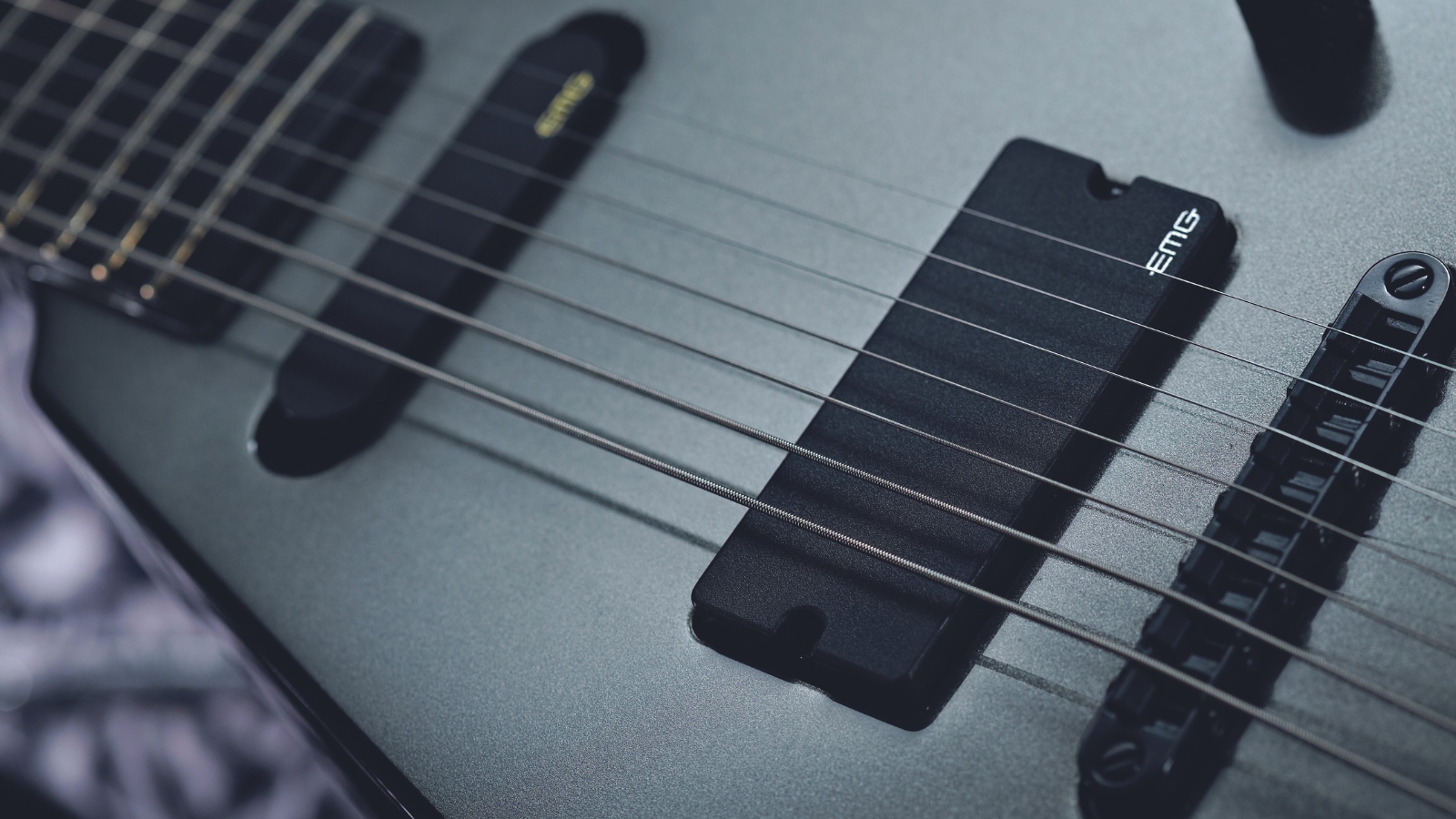
At Guitar World, we're not just writers; we're devoted metalheads with a wealth of live and studio experience. Our process of selecting the best metal guitars involves a meticulous examination of tonal aggression, playability, build quality, and value for money. Rigorously tested across various metal genres, our recommendations meet the demands of that most discerning type of guitarist; the metalhead.
Precision and power define the metal genre, and our selection mirrors this ethos. We'd never recommend something that we wouldn't use ourselves, and having played in many metal bands over the years, we know what's expected of a properly good metal guitar.
Whether you're a beginner or a seasoned shredder, the products in this guide will cover a spectrum of metal guitars, from affordable options to extended-range instruments. Each recommendation has earned its place through rigorous testing, ensuring it aligns with the uncompromising standards of the metal genre.
Related buyer's guides
You can trust Guitar World
- Protect your hearing with the best earplugs for musicians
- Play it loud with the best amps for metal
- Play faster with the best guitars for shredding
- Keep the cost down with the best budget guitar amplifiers under $500
- Stock up on the best electric guitar strings
- Lose your head in the best headless guitars
- Bring the noise with the best guitar strings for metal
Get The Pick Newsletter
All the latest guitar news, interviews, lessons, reviews, deals and more, direct to your inbox!
Jonathan Horsley has been writing about guitars since 2005, playing them since 1990, and regularly contributes to publications including Guitar World, MusicRadar and Total Guitar. He uses Jazz III nylon picks, 10s during the week, 9s at the weekend, and shamefully still struggles with rhythm figure one of Van Halen’s Panama.
- Matt McCrackenJunior Deals Writer
- Richard Blenkinsop
“The most in-demand mods straight from the factory”: Fender’s elevated Player II Modified line brings the firm’s most sought-after guitar upgrades to the masses
“I used to weigh my guitars and use the heaviest one. As I’ve got older and my back’s got worse, lighter guitars are definitely better”: Lee Malia’s Jackson signature completes a full circle 20 years in the making – and it redefines what a Jackson can be

